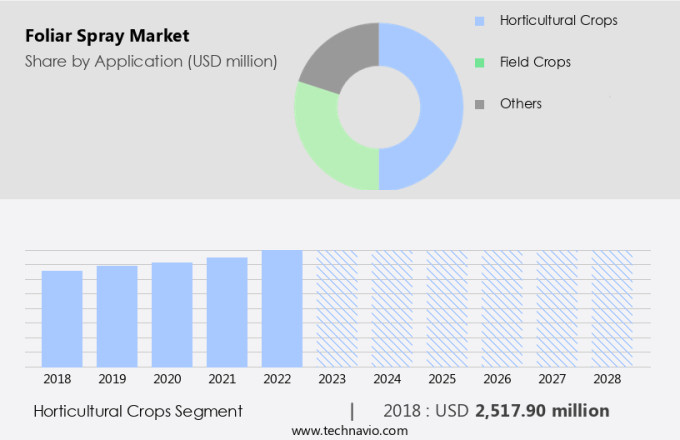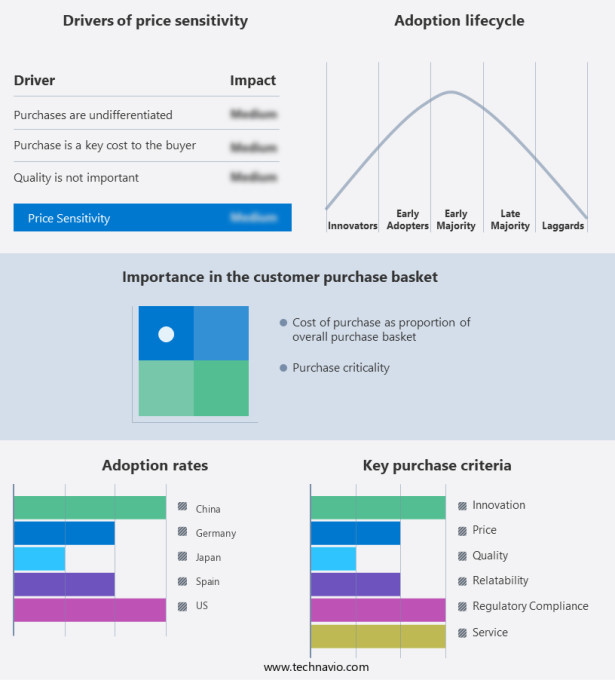Foliar Spray Market Size 2024-2028
The foliar spray market size is forecast to increase by USD 3.01 billion at a CAGR of 7.44% between 2023 and 2028. The market is experiencing significant growth due to several key factors. The increasing emphasis on enhancing plant productivity and improving crop quality has led to the rising popularity of foliar spray applications. Foliar sprays provide a direct and efficient method for delivering essential nutritional elements, including organic matter, fertilizers, main elements, and trace elements, directly to the plant leaves. The main elements required by plants include nitrogen, phosphorus, and potassium, while trace elements like boron, calcium, copper, silicon, and zinc are essential for optimal plant growth. This method of fertilization is particularly beneficial for enhancing the absorption of nutrients by the plant, especially during periods of water stress or adverse weather conditions. The growing market for fruits and vegetables, which require optimal nutrient levels for high yields and superior quality, is also driving the demand for foliar sprays.
Additionally, stringent regulations on the handling, storage, and transportation of liquid fertilizers have led to the increased adoption of foliar sprays as an alternative to traditional liquid fertilizers. In summary, the market is witnessing growth due to its efficiency, ability to improve crop quality, and compliance with regulatory requirements.
The market for foliar sprays in the plant industry is gaining traction due to the increasing awareness among home gardeners and farmers regarding the importance of maintaining optimal plant health. Foliar spray applications provide an effective solution to address nutrient deficiencies and improve the overall vitality of plants. Foliar sprays are essential for supplying nutrients directly to the leaves of plants. These nutrients, often in the form of water-soluble powders or liquid fertilizers, are easily absorbed by the plant through its leaves, bypassing the soil. Aspirin, kelp, compost tea, and weed tea are some common ingredients used in foliar sprays.
Furthermore, nutrient deficiencies can significantly impact plant growth and development. Soil conditions, weather, and the plant's root system all play a role in the availability of essential nutrients. Foliar fertilization is an effective method to supplement the nutrients that the plant requires when soil conditions are less than optimal. The main elements, such as nitrogen, phosphorus, and potassium, are crucial for plant growth. Trace elements, including calcium, magnesium, and iron, are also essential for the proper functioning of the plant's metabolic processes. Foliar sprays can help address deficiencies in these elements, ensuring the plant's healthy growth. Acidity and the physicochemical properties of the soil, including texture, mutual balances, and water-holding capacity, can significantly impact nutrient availability.
Moreover, foliar sprays can help mitigate the effects of soil acidity and improve the plant's ability to absorb nutrients. Plants can experience various issues when nutrient deficiencies go unaddressed. Defective leaf functioning can lead to asphyxia, making it difficult for the plant to photosynthesize effectively. Soil infections, such as those caused by nematoda, can also impact plant health. Soil compaction can limit the plant's ability to absorb water and nutrients, further impacting its growth. Foliar sprays offer a targeted solution to these issues, providing the plant with the necessary nutrients to thrive. By addressing nutrient deficiencies, gardeners and farmers can improve crop yields and ensure the health and vitality of their plants.
Market Segmentation
The market research report provides comprehensive data (region-wise segment analysis), with forecasts and estimates in "USD billion" for the period 2024-2028, as well as historical data from 2018-2022 for the following segments.
- Application
- Horticultural crops
- Field crops
- Others
- Type
- Nitrogenous
- Potassic
- Phosphatic
- Others
- Geography
- APAC
- China
- Japan
- Europe
- Germany
- Spain
- North America
- US
- South America
- Middle East and Africa
- APAC
By Application Insights
The horticultural crops segment is estimated to witness significant growth during the forecast period. The horticulture industry encompasses various crops, including fruit, vegetable, tuber, medicinal and aromatic plants, and spices. These crops have gained significant importance in the food industry due to their nutritional benefits and increasing consumption rates. According to recent data, fruit and vegetable consumption in the United States has seen a steady increase, with a growth rate of over 10% between 2015 and 2022. This trend is anticipated to persist in the upcoming years, driven by their strong export potential. Foliar spraying is a crucial practice in horticulture production, particularly for fruit trees. This method involves spraying the leaves with nutrient solutions to enhance their growth and protect against various threats.
For example, foliar applications can help eliminate spider mites in fruit trees during the summer season. The physicochemical properties of foliar sprays, such as acidity and texture, play a significant role in their effectiveness. However, improper application of foliar sprays can lead to defective functioning, asphyxia, and soil infections. Nematoda, a type of soil-dwelling worm, can cause significant damage to crops by feeding on their roots. Soil compaction can also negatively impact foliar spray application, reducing their penetration and effectiveness. Therefore, it is essential to maintain mutual balances between soil health, foliar spray application, and crop health to ensure optimal crop production.
Get a glance at the market share of various segments Request Free Sample
The horticultural crops segment accounted for USD 2.52 billion in 2018 and showed a gradual increase during the forecast period.
Regional Insights
APAC is estimated to contribute 49% to the growth of the global market during the forecast period. Technavio's analysts have elaborately explained the regional trends and drivers that shape the market during the forecast period.
For more insights on the market share of various regions Request Free Sample
The Asia Pacific (APAC) region, which is home to over 4.6 billion people in 2021 and is projected to reach 5.3 billion by 2050, is witnessing a significant increase in population. This demographic shift has led to a growing demand for agricultural products to feed the expanding population. In response, farmers in APAC are turning to foliar sprays to enhance crop yields and improve product quality. Foliar sprays, which deliver nutrients directly to the leaves, are particularly effective for crops such as wine grapes, corn, and pears. However, the use of foliar sprays can pose environmental concerns, as they may contain chemicals that can pollute rivers and groundwater if not applied properly.
Furthermore, to mitigate these risks, farmers are adopting best practices such as using targeted applications and minimizing runoff. The shift towards high protein-based diets in APAC, particularly in countries like India and China, is expected to further drive the demand for foliar sprays to produce nitrogen-rich crops. In conclusion, the growing population in APAC and changing food preferences are fueling the demand for foliar sprays in agriculture, necessitating the adoption of sustainable practices to minimize environmental impact.
Our researchers analyzed the data with 2023 as the base year, along with the key drivers, trends, and challenges. A holistic analysis of drivers will help companies refine their marketing strategies to gain a competitive advantage.
Market Driver
Increasing efficiency of foliar spray products is the key driver of the market. Foliar sprays offer an efficient solution for home gardeners to address nutrient deficiencies in their plants without relying solely on soil-applied fertilizers. These water-soluble nutrient solutions, available as powders or liquids, are easily applied to plant foliage for immediate absorption. Aspirin and natural alternatives like kelp and compost tea are also popular choices for foliar sprays, providing additional benefits such as disease prevention and improved plant health. The foliar spray method ensures uniform distribution of nutrients, minimizing wastage and maximizing agricultural output. This method is particularly beneficial for addressing specific nutrient requirements or correcting deficiencies, ultimately leading to healthier plants and increased productivity in home gardens.
In addition, the ease of application and effectiveness of foliar sprays have contributed to their growing popularity in the lawns and gardens segment.
Market Trends
Growing market for fruits and vegetables is the upcoming trend in the market. The global consumption of fruits and vegetables has witnessed significant growth in recent times, driven by the expanding population of vegetarians and vegans worldwide. In countries such as India, where a large portion of the populace follows a vegetarian diet, the demand for these food items is substantial. Likewise, in nations like the United States, Canada, and the UK, the increasing number of individuals embracing veganism has fueled the demand for fruits and vegetables. The millennial demographic in these countries is particularly significant, as they are adopting vegetarian or vegan diets due to ethical concerns regarding animal cruelty. Foliar spray, a method of delivering essential nutrients directly to the plant's leaves, has gained popularity as an organic alternative to traditional fertilization.
Furthermore, foliar spraying allows for the efficient delivery of nutritional elements, including organic matter, main elements, and trace elements, directly to the plant's foliage. This method is particularly beneficial during periods of water stress or adverse weather conditions, ensuring optimal plant health and growth.
Market Challenge
Stringent regulations on handling, storage, and transportation of liquid fertilizers is a key challenge affecting the market growth. It is essential to address the potential risks associated with handling and spillage of fertilizers in the horticulture industry. Unintended spillage from conveyor belts or containers in manufacturing facilities can lead to environmental and health concerns if not managed properly.
Furthermore, contaminated fertilizers, such as ammonium nitrate, which do not adhere to regulatory standards, must be disposed of correctly. This can be achieved by dissolving them in suitable media or rendering them inert to prevent harm. Failure to do so can result in serious health and environmental hazards. Given the importance of various fertilizers in gardening, including herbal tea, fish emulsion, comfrey tea, potash, and nitrogen, it is crucial to follow safe handling procedures.
Exclusive Customer Landscape
The market forecasting report includes the adoption lifecycle of the market, covering from the innovator's stage to the laggard's stage. It focuses on adoption rates in different regions based on penetration. Furthermore, the report also includes key purchase criteria and drivers of price sensitivity to help companies evaluate and develop their market growth analysis strategies.
Customer Landscape
Key Companies & Market Insights
Companies are implementing various strategies, such as strategic alliances, partnerships, mergers and acquisitions, geographical expansion, and product/service launches, to enhance their presence in the market.
Agronutrition - The company offers foliar spray products such as Fertigofol 4 2 7.
The market research and growth report includes detailed analyses of the competitive landscape of the market and information about key companies, including:
- Aries Agro Ltd
- Cippy Bio International
- Compass Minerals International Inc.
- EuroChem Group AG
- Gardening Know How
- Grupa Azoty SA
- Haifa Negev technologies Ltd.
- Israel Chemicals Ltd.
- KS Aktiengesellschaft
- Murugappa Group
- Nutrien Ltd.
- Prabhat Fertilizer and Chemical Works
- Sichuan Shucan Chemical Co. Ltd.
- SQM S.A.
- Tessenderlo Group NV
- Tribodyn GmbH
- UAB Bioenergy LT
- Wuhan Lvyin Chemical Co. Ltd.
- Yara International ASA
Qualitative and quantitative analysis of companies has been conducted to help clients understand the wider business environment as well as the strengths and weaknesses of key market players. Data is qualitatively analyzed to categorize companies as pure play, category-focused, industry-focused, and diversified; it is quantitatively analyzed to categorize companies as dominant, leading, strong, tentative, and weak.
Research Analyst Overview
Foliar spray is a popular method used in horticulture to provide essential nutrients directly to plants, bypassing the soil. Home gardeners often use this technique to address nutrient deficiencies in their plants. Foliar sprays can be made using various materials, such as aspirin, water-soluble powder, liquid fertilizers, kelp, compost tea, weed tea, herbal tea, fish emulsion, comfrey tea, potash, nitrogen, and other nutritional elements. These materials are mixed in a blender and diluted with water to create a spray solution. Plants absorb nutrients through their root system, but foliar spraying allows for the direct application of nutrients to the leaves.
In addition, weather conditions, acidity, and the physicochemical properties of the spray solution can affect the absorption of nutrients. Nutrient deficiencies can lead to defective plant functioning, including asphyxia, soil infections, pest attacks, and diseases. High salt levels, nematoda, soil compaction, and soil infections can also negatively impact plant growth. Foliar fertilization can improve plant vigor, yield, and quality, particularly for fruits such as wine grapes, corn, and pears. Organic matter, such as compost tea and fish emulsion, can also be used to enhance the nutritional value of foliar sprays. Farmers use foliar sprays to mitigate the effects of pollution on crops and improve the quality of their produce.
|
Market Scope |
|
|
Report Coverage |
Details |
|
Page number |
163 |
|
Base year |
2023 |
|
Historic period |
2018-2022 |
|
Forecast period |
2024-2028 |
|
Growth momentum & CAGR |
Accelerate at a CAGR of 7.44% |
|
Market growth 2024-2028 |
USD 3.01 billion |
|
Market structure |
Fragmented |
|
YoY growth 2023-2024(%) |
6.4 |
|
Regional analysis |
APAC, Europe, North America, South America, and Middle East and Africa |
|
Performing market contribution |
APAC at 49% |
|
Key countries |
US, China, Spain, Japan, and Germany |
|
Competitive landscape |
Leading Companies, Market Positioning of Companies, Competitive Strategies, and Industry Risks |
|
Key companies profiled |
Agronutrition, Aries Agro Ltd, Cippy Bio International, Compass Minerals International Inc., EuroChem Group AG, Gardening Know How, Grupa Azoty SA, Haifa Negev technologies Ltd., Israel Chemicals Ltd., KS Aktiengesellschaft, Murugappa Group, Nutrien Ltd., Prabhat Fertilizer and Chemical Works, Sichuan Shucan Chemical Co. Ltd., SQM S.A., Tessenderlo Group NV, Tribodyn GmbH, UAB Bioenergy LT, Wuhan Lvyin Chemical Co. Ltd., and Yara International ASA |
|
Market dynamics |
Parent market analysis, market growth inducers and obstacles, market forecast, fast-growing and slow-growing segment analysis, COVID-19 impact and recovery analysis and future consumer dynamics, market condition analysis for the forecast period |
|
Customization purview |
If our market report has not included the data that you are looking for, you can reach out to our analysts and get segments customized. |
What are the Key Data Covered in this Market Research and Growth Report?
- CAGR of the market during the forecast period
- Detailed information on factors that will drive the market growth and forecasting between 2024 and 2028
- Precise estimation of the size of the market and its contribution of the market in focus to the parent market
- Accurate predictions about upcoming market growth and trends and changes in consumer behaviour
- Growth of the market across APAC, Europe, North America, South America, and Middle East and Africa
- Thorough analysis of the market's competitive landscape and detailed information about companies
- Comprehensive analysis of factors that will challenge the growth of market companies
We can help! Our analysts can customize this market research report to meet your requirements. Get in touch




